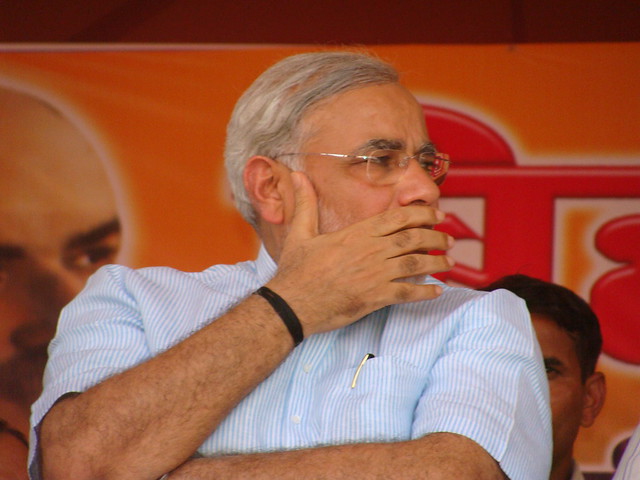Tuesday 27 May 2014
Saturday 24 May 2014
The Prime Ministers of India
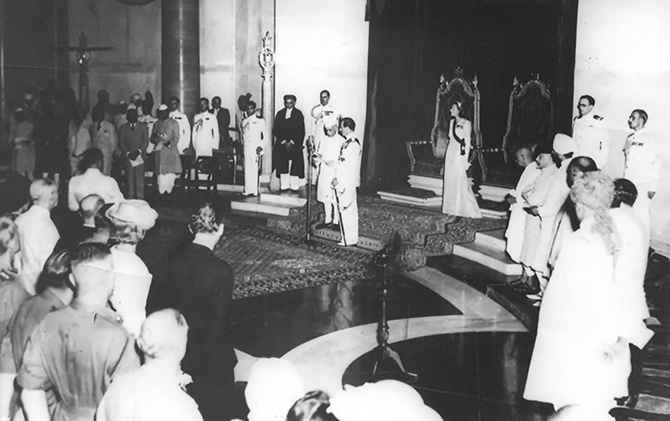
Jawaharlal Nehru being sworn in as India's first prime minister on August 15, 1947.
On August 15, 1947 as India attained Independence, Jawaharlal Nehru was sworn in as the first prime minister of the free nation. His oath of office was administered by Lord Louis Mountbatten, the last Viceroy of India.
Nehru, considered the architect of modern India, served as prime minister till his death 50 years ago on May 27, 1964, spearheading the Congress party's victory in the first three Lok Sabha elections of 1952, 1957 and 1962.
His 16 years and 286 days-long term in office makes him the longest-serving prime minister till date.
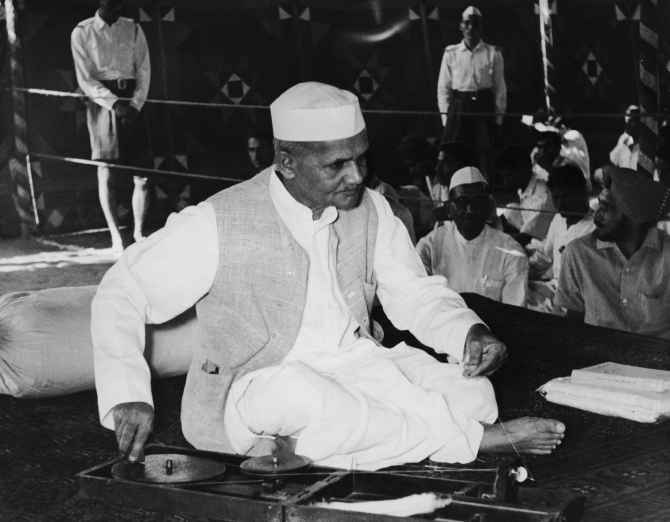 |
| Lal Bahadur Shastri celebrates his own and Mahatma Gandhi's birthday, October 2, by spinning the charkha at the Gandhi samadhi in New Delhi. |
The huge void created after Nehru's death was filled when Lal Bahadur Shastri -- the diminutive politician from Uttar Pradesh who held portfolios like home and railways in Nehru's Cabinet -- took over as India's second prime minister on June 9, 1964.
Shastri's tenure was cut short by his untimely death on January 11, 1966, in Tashkent, in the then Soviet Union. He had served as prime minister for a mere 19 months.
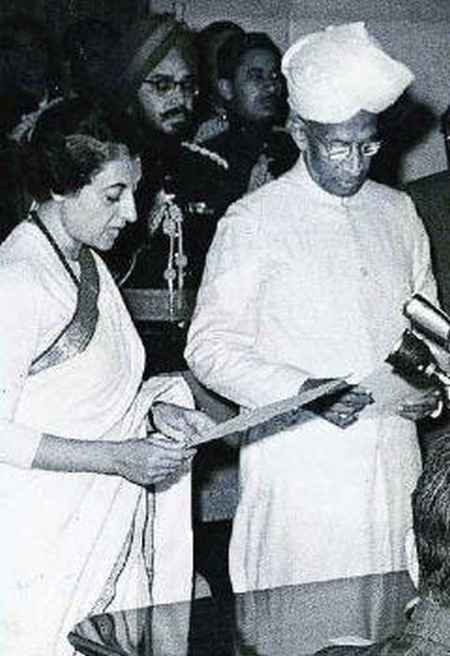 |
| President Sarvepalli Radhakrishnan administers the oath of office to Indira Gandhi on January 24, 1966.
Jawaharlal Nehru's only child, Indira Gandhi, took over as India's third prime minister on January 24, 1966, following Shastri's death and remained in office till March 24, 1977, when public ire against the Emergency saw her swept out of power.
During her first term in office she broke with the old guard in the Congress that cossetted her into power in the belief that she would be a pliable leader ('goongi gudiya (dumb doll)' was the term they used for her) discovering to their utter shock that the lady packed a spine of steel.
She won the 1967 election (the first general election where the Congress did badly), the 1971 election (the Congress won 350 seats) and the 1980 election where she returned to power after three years out of office.
Opinion is sharply divided over her legacy. While her supporters regard Indira Gandhi as a strong leader who ushered in lasting changes, her critics believe she misused her power, especially when she imposed the infamous Emergency from June 1975 to March 1977 during which she ruled by decree.
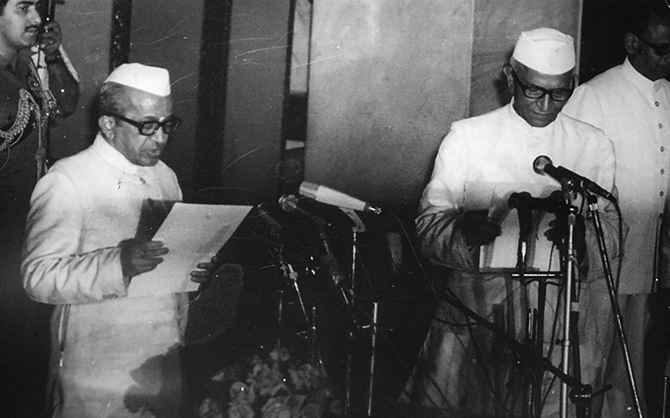 |
Morarji Desai, right, being sworn in as India's first non-Congress prime minister on March 24, 1977 by then acting President B D Jatti.
The Congress veteran -- he was finance minister under Indira Gandhi -- was, ironically, India's first non-Congress prime minister.
Desai, who stayed on with the original Congress when Indira Gandhi split the party, and which was resounding rejected by the electorate in the 1971 general election, led the Janata Party to a landslide victory in the 1977 election under Jayaprakash Narayan's guidance.
Desai, then 81, was sworn in as the fourth prime minister on March 24, 1977.
Just two years and 126 days later, Desai was forced to resign on July 28, 1979, paving the way for former deputy prime minister, Charan Singh, to succeed him.
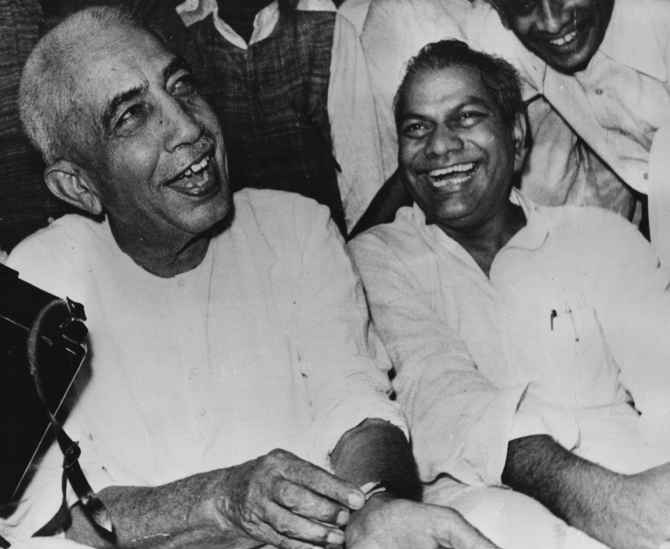
Choudhry Charan Singh, left
after becoming prime minister on July 28, 1979
Choudhary Charan Singh, deputy prime minister in the Morarji Desai Cabinet, took over as the fifth prime minister on July 28, 1979.
His stint was short lived and he resigned following the Indira Gandhi-led Congress's withdrawal of support to his government.
Charan Singh is the only prime minister who did not face the Lok Sabha even for a day during his short tenure.
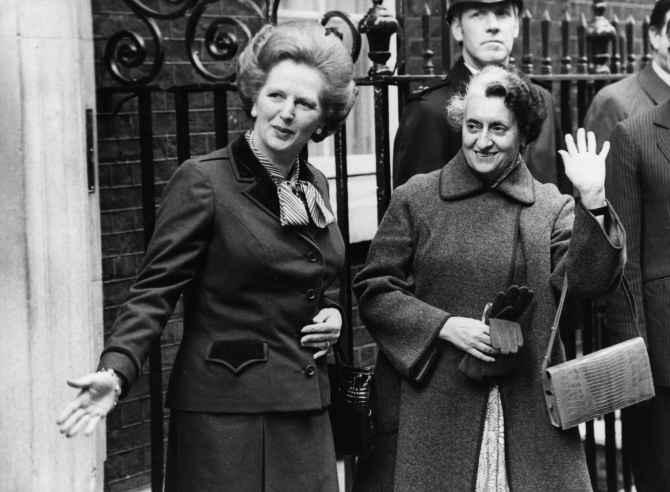
Indira Gandhi with her British counterpart Margaret Thatcher outside 10, Downing Street in London, March 1982.
The Congress-I (for Indira) led by Indira Gandhi made a big comeback in the 1980 general election.
Uneasy with the unstable Janata Party governments, voters gave the Congress 353 Lok Sabha seats.
Indira Gandhi began her second stint as prime minister on January 14, 1980. Six months later, her never-say-die spirit seem to go out after her younger son and political counsellor Sanjay Gandhi died in an air crash.
Her government was beset by an insurgency in Punjab and unrest in Assam. To quell the Khalistani rebellion mounted from the Golden Temple, she ordered the Indian Army into Sikhism's holiest shrine. Operation Blue Star cleared the Golden Temple of the rebels, but came at high cost -- innocent pilgrims and soldiers were killed, both the Akal Takht and the Harmandir Saheb were badly damaged.
Indira Gandhi paid the highest price for her decision. Refusing to remove her Sikh bodyguards, she was assassinated on October 31, 1984, by Beant Singh and Satwant Singh, in revenge for Operation Blue Star.
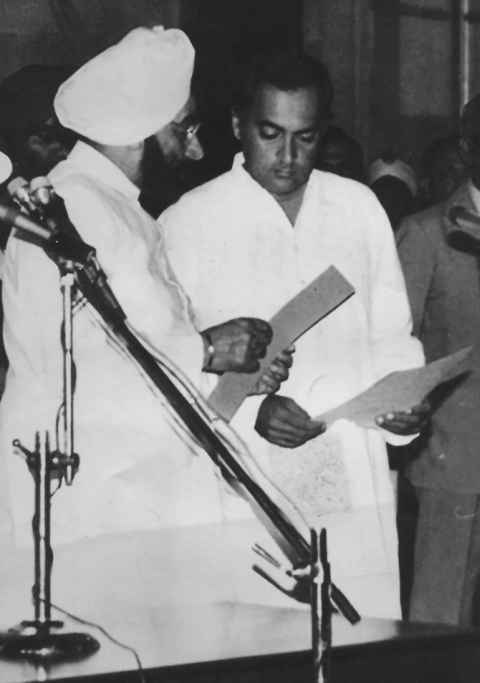
Rajiv Gandhi sworn in as India's sixth prime minister by then President Giani Zail Singh on October 31, 1984, hours after his mother Indira Gandhi's assassination.
Indira Gandhi's elder son Rajiv Gandhi, who was just 40 years old then, took over as India's sixth prime minister hours after his mother's assassination.
In the election that followed, the Congress party won 414 Lok Sabha seats, a majority that was denied even to his grandfather Jawaharlal Nehru.
Rajiv began well, promising to clean up the system, condemning power-brokers in the Congress at the party's centenary celebrations in Mumbai. He is credited with ushering in the computer era in the country, and for his 21st century vision.
Initially acclaimed as Mr Clean, his government was accused of involvement in the notorious Bofors kickbacks scandal where Rs 640 million was paid as bribes to approve the Swedish howitzer for the Indian Army. Worse, politically insecure, he caved in to orthodox elements in both the Hindu and Muslim communities.
His finance minister V P Singh resigned from the Union Cabinet and challenged him. Rajiv Gandhi lost the 1989 general election (though the Congress remained the single largest party in the Lok Sabha). Two years later, when he was on the comeback trail, he was assassinated by the Tamil Tigers in Tamil Nadu.
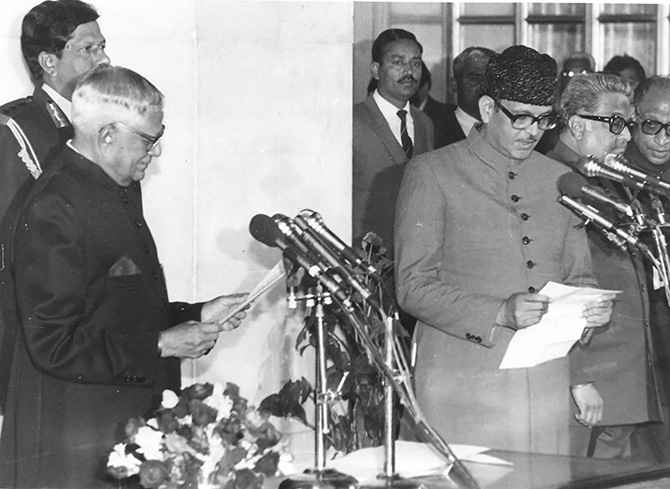
Vishwanath Pratap Singh being sworn in as India's seventh prime minister on December 2, 1989, by then President Ramaswamy Venkataraman.
Vishwanath Pratap Singh's National Front formed the government after the 1989 election, with external support from both the Bharatiya Janata Party and Left parties, a balancing act if ever there was one.
After V P Singh implemented the Mandal Commission's recommendations for more reservations for the Other Backward Classes in educational institutions and the government jobs, BJP leader Lal Kishenchand Advani -- worried that Singh's decision would cause a loss of support for his party -- embarked on a Rath Yatra to Ayodhya, site of the disputed Ram Janambhoomi-Babri Masjid.
When he was arrested by the Janata Dal's chief minister in Bihar, Lalu Prasad Yadav, in Samastipur in October 1990, the BJP promptly withdrew support, causing the collapse of the V P Singh government.
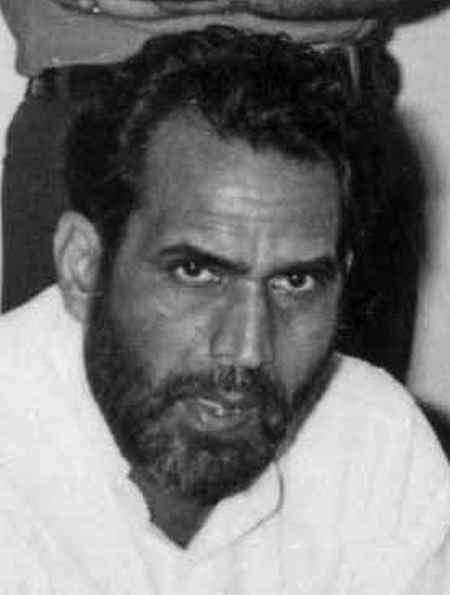
Chandra Shekhar, India's eighth prime minister.
Chandra Shekhar, the Young Turk of the Congress party in the late 1960s and early 1970s, fell out with Indira Gandhi shortly before the Emergency. After she was voted out of power in March 1977, Chandra Shekhar was appointed president of the Janata Party.
When the Janata Party evolved into the Janata Dal, Chandra Shekhar and V P Singh, by then the party's talisman, disagreed on virtually everything.
When the V P Singh government fell, Chandra Shekhar broke away with 64 MPs and formed the Samajwadi Janata Party, and was sworn in as India's eighth prime minister on November 10, 1990. The Congress supported the Chandra Shekhar government from outside.
Chandra Shekhar lasted a little longer than Charan Singh -- he resigned after the Congress withdrew support, alleging that his government was spying on Rajiv Gandhi
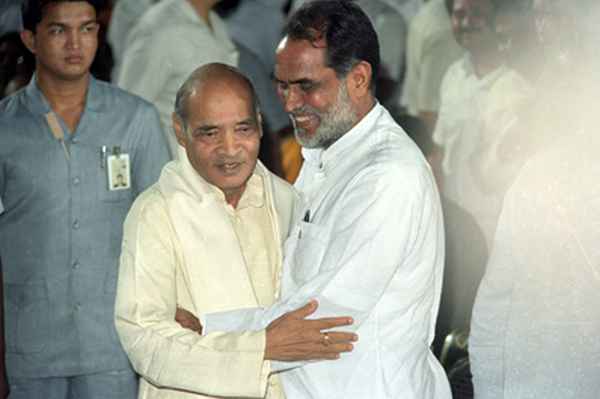
P V Narasimha Rao, left, greeted by outgoing prime minister Chandra Shekhar, during the former's swearing-in ceremony on June 21, 1991.
The Congress formed a minority government with the support of the Left parties after the 1991 general election which was largely fought against the background of the Mandal Commission fallout and the Ram Janambhoomi-Babri Masjid issue.
Led by P V Narasimha Rai, it remains the only minority government to complete a full term in office, largely due to the uncertainties surrounding India then and no one willing to broil the situation further by engineering political uncertainty.
Former prime minister Rajiv Gandhi was assassinated after the first phase of polling at Sriperumbudur in Tamil Nadu, and the Congress swept the constituencies that went to the polls in the remaining phases.
Rao was sworn in as India's ninth prime minister on June 21, 1991, and is responsible for ushering in economic liberalisation in the country
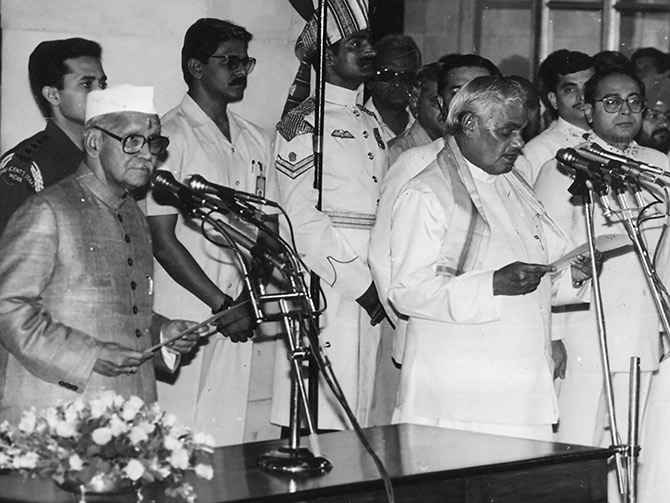
Atal Bihari Vajpaye being sworn in as the tenth prime minister on May 16, 1996, by then President Shankar Dayal Sharma.
After the 1996 general election resulted in a hung Parliament, the country witnessed three prime ministers in two years and forced the country back to the hustings in 1998.
BJP leader Atal Bihari Vajpayee was sworn in as the country's tenth prime minister on May 16, 1996 after his party emerged as the single largest party in the Lok Sabha.
Vajpayee resigned after 13 days in office when he realised that the BJP would not muster enough support to obtain a majority.
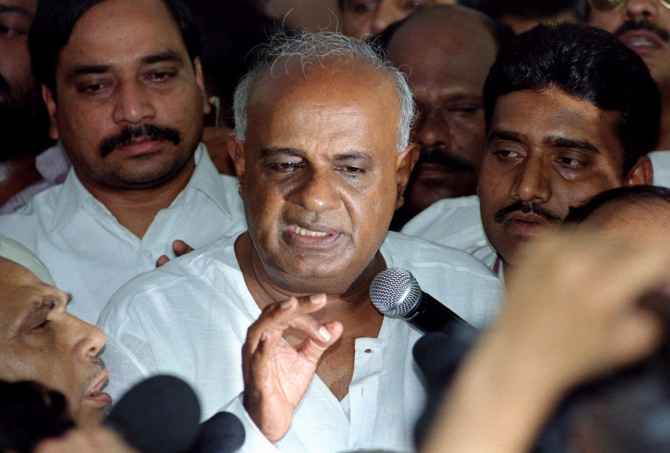
H D Deve Gowda speaks to the media after a crucial meeting with United Front constituents in New Delhi on May 29, 1996
Karnataka Chief Minister H D Deve Gowda was unexpectedly chosen by the non-Congress, non-BJP regional parties to lead the United Front government after the Vajpayee government fell.
Deve Gowda was sworn in as India's 11th prime minister on June 1, 1996, and remained in office till April 21, 1997, when the Sitaram Kesri-led Congress sought a change of guard for reasons that are still not very clear.
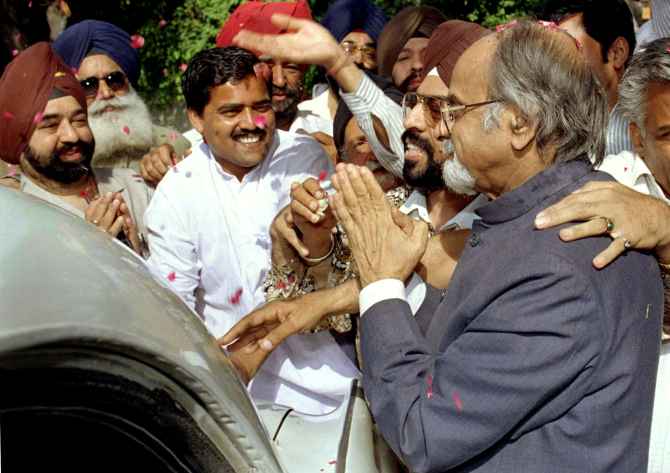
I K Gujral greets supporters on his way to his swearing in as India's 12th prime minister.
Following H D Deve Gowda's resignation, then external affairs minister Inder Kumar Gujral emerged as the consensus candidate to lead the United Front government.
He was sworn in as the 12th prime minister on April 21, 1997 and resigned on November 28, 1997 after the Congress withdrew support over the Jain Commission issue.
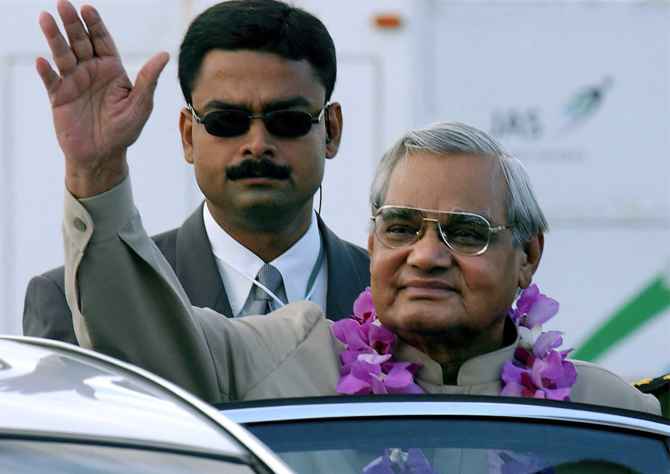
Prime Minister Vajpayee during a visit to Bali, Indonesia, in October 2003.
After the two United Front governments between 1996 and 1998 fell, fresh elections were held in 1998 in which the BJP came ahead of the others although it was well short of a majority.
Still, after two years of political instability and experimentation, and with the Congress unwilling to seek allies, the BJP-led National Democratic Alliance formed the government after regional parties gathered under its banner to provide a stable government.
Within weeks of coming to power Vajpayee decided to take the country on the nuclear path, for which international condemnation quickly followed.
The government, shaky to begin with, saw an irrepressible ally in Jayalalithaa's All India Anna Dravida Munnetra Kazagham which decided to withdraw support to the NDA after a famous tea party she had with Congress President Sonia Gandhi.
In the trust vote that ensued in Parliament, the Vajpayee government lost by a single vote.
If in its first avatar it lasted 13 days, its second stint in power lasted 13 months.
Elections were held again in 1999 where the BJP-led NDA won 303 seats. The BJP remained the single largest party.
Vajpayee was sworn in as the prime minister for the third time on October 13, 1999 and led a stable government for the next five years.
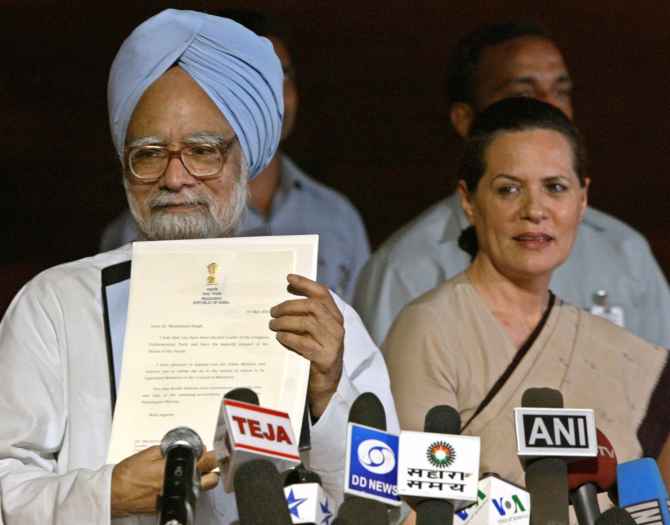
Manmohan Singh flanked by Congress President Sonia Gandhi displays an invitation received from then President A P J Abdul Kalam to form the government on May 19, 2004.
The Congress staged a comeback in the 2004 general election and emerged as the single largest party, ahead of the certain-to-win BJP, and was quickly assured of outside support by the Bahujan Samaj Party, Samajwadi Party and the Left parties (the Communists had their best performance ever in this election).
Congress President Sonia Gandhi declined the prime minister's post and instead chose former finance minister Manmohan Singh, who was sworn in as the 13th prime minister on May 22, 2004.
Given his image as a 'reformer', no one expected the arrangement to continue given the government's dependence on the Left, but the break came over the India-US nuclear deal to which the Left was bitterly opposed.
The United Progressive Alliance government survived the trust vote on July 22, 2008, following the break with the Left, thanks to some nimble political manouevres.
The Manmohan Singh-led UPA won the 2009 general election as the alliance posted a comfortable majority of 322 seats.
Friday 23 May 2014
What it means to have an uneducated leader
A lack of education produces two qualities—instinct to simplify and certitude
Read Here
http://www.livemint.com/Leisure/JJBNMeTBDxPN187zJVOcOJ/What-it-means-to-have-an-uneducated-leader.html
Monday 19 May 2014
News & Info Todays Head Lines
19 May 2014

Sonia, Rahul offer to resign at CWC meeting:
Sonia and Rahul had offered to resign, but their offer was rejected unanimously, by the members.
Earlier reports said that while Sonia and Rahul Gandhi would be insulated from the poll debacle, the entire CWC would give in their resignations for 'collective responsibility' in the party's worst poll results ever
>>Narendra Modi tweets: "My gratitude to @UN Secretary General Mr. Ban Ki-moon for his good wishes. India values our long & proud relationship with the UN."
And this one...
"Had a telephonic conversation with PM of Spain Mr. Mariano Rajoy. We look forward to working with each other to strengthen India-Spain ties."

Sonia, Rahul offer to resign at CWC meeting:
Sonia and Rahul had offered to resign, but their offer was rejected unanimously, by the members.
Earlier reports said that while Sonia and Rahul Gandhi would be insulated from the poll debacle, the entire CWC would give in their resignations for 'collective responsibility' in the party's worst poll results ever
 |
| Jitan Ram Manjhi >>Nitish Kumar names Jitan Ram Manjhi as the next chief minister of Bihar. |
>>Narendra Modi tweets: "My gratitude to @UN Secretary General Mr. Ban Ki-moon for his good wishes. India values our long & proud relationship with the UN."
And this one...
"Had a telephonic conversation with PM of Spain Mr. Mariano Rajoy. We look forward to working with each other to strengthen India-Spain ties."
>>Azam says Muslims contributed to Modi's victory, proved they are secular: Suggesting that Muslims have contributed to Narendra Modi's victory in the 2014 Lok Sabha elections, SP leader Azam Khan, who had indulged in a vitriolic attack on the BJP leader, said they had proved that they were a "secular" community.
"Narendra Modi's victory in the Lok Sabha polls has amply proved that Indian Muslims were and are secular," he said last evening.
The UP Minister, however, said that the Muslims were lured by "false promises" made by BJP even as he defended Chief Minister Akhilesh Yadav and SP supremo Mulayam Yadav and blamed UPA's policies for the party's drubbing in the state.
"Narendra Modi's victory in the Lok Sabha polls has amply proved that Indian Muslims were and are secular," he said last evening.
The UP Minister, however, said that the Muslims were lured by "false promises" made by BJP even as he defended Chief Minister Akhilesh Yadav and SP supremo Mulayam Yadav and blamed UPA's policies for the party's drubbing in the state.
>>
 India's next prime minister is planning a quiet trip to India's borders within the first two weeks of assuming office. Narendra Modi plans to visit the Wagah border, NJ 9842 in Siachen and Petrapole near Bangladesh in what is believed to be a morale boost to the armed forces.
India's next prime minister is planning a quiet trip to India's borders within the first two weeks of assuming office. Narendra Modi plans to visit the Wagah border, NJ 9842 in Siachen and Petrapole near Bangladesh in what is believed to be a morale boost to the armed forces.
In September last year, Modi questioned the need for dialogue between Prime Minister Manmohan Singh his Pakistani counterpart Nawaz Sharif when "soldiers and innocent people were being killed day and night by terrorists in Jammu and Kashmir". He had attacked the Centre for "pursuing a weak" policy in dealing with Pakistan.
While Modi's foreign policy is expected to continue in the same lines as the UPA, his key aide Amit Shah has said his government would however, never compromise with the honour and security of the country.

Modi may visit Wagah, Siachen, Bangladesh border after becoming PM
 India's next prime minister is planning a quiet trip to India's borders within the first two weeks of assuming office. Narendra Modi plans to visit the Wagah border, NJ 9842 in Siachen and Petrapole near Bangladesh in what is believed to be a morale boost to the armed forces.
India's next prime minister is planning a quiet trip to India's borders within the first two weeks of assuming office. Narendra Modi plans to visit the Wagah border, NJ 9842 in Siachen and Petrapole near Bangladesh in what is believed to be a morale boost to the armed forces. In September last year, Modi questioned the need for dialogue between Prime Minister Manmohan Singh his Pakistani counterpart Nawaz Sharif when "soldiers and innocent people were being killed day and night by terrorists in Jammu and Kashmir". He had attacked the Centre for "pursuing a weak" policy in dealing with Pakistan.
While Modi's foreign policy is expected to continue in the same lines as the UPA, his key aide Amit Shah has said his government would however, never compromise with the honour and security of the country.

राष्ट्रपति श्री प्रणब मुखर्जी राष्ट्रपति भवन में 19 मई 2014 को पूर्व राष्ट्रपति नीलम संजीव रेड्डी की जयंती पर उन्हें पुष्पांजलि अर्पित करते हुए।
The President, Shri Pranab Mukherjee paying floral tribute at the portrait of the former President of India, Shri Neelam Sanjiva Reddy, on his birth anniversary, at Rashtrapati Bhavan, in New Delhi on May 19, 2014.Friday 9 May 2014
“Leaders” should learn from the people
BY : Dr Mohammad Manzoor Alam
Quite often an occasion arises in public life when even good leaders lose contact with public mood and do things that drive them further away from the people. At the time of partition of India,Maulana Abul Kalam Azad was so exasperated that he said a point had reached in his political career where he had to decide whether he wanted to lead the people or be led by them. The third course, that of ignoring the people, would further isolate him.
Today, we see a similar gap between the ideas and strategies of leaders of some Muslim organisations and common Muslims of India. While common Muslims are confirmed that the “BJP-Modi wave” is the creation of corporate media and big business, leaders of several Muslim organisations have been misled by the media disinformation campaign.
The more lamentable fact is that these so-called leaders have started believing the propaganda by RSS workers assigned to work among Muslims. They have started believing that there is no difference between the BJP and Congress. This confusion is sure to benefit the fascist group. However, there is the hope that common Muslims are far more intelligent than these leaders. Common Muslims can easily distinguish between grey and black, while these leaders fail to make any distinction between shades of evil. This has been possibly the greatest casualty of the disinformation campaign unleashed by the media.

The Muslim organisations referred to above have issued an appeal to Muslim voters to vote for parties other than the BJP and Congress, which means limiting voters’ choice to regional parties only. That hardly seems to be a realistic or practical idea. It also shows that both parties are the same, which is not the case. Supposing limiting one’s choice to regional parties hurts the prospects of one of the national parties, which party one would like to protect more than the other.
The position of “leaders” here seems to be in sharp dissonance with the Muslim public mood. That makes these leaders’ prescriptions all the more untenable. This is exactly the dissonance between the leader and the led that stalwarts like Maulana Azad dreaded and every leader worth the name should dread.
Thank God, the people know better than their self-proclaimed leaders.
Wednesday 7 May 2014
AIMCK
https://t.co/mBetDNonuH
It will not be easy for the Modi sarkar to wash off the Dadri stain: Here's why
by R Jagannathan
The unconscionable lynching to death of Mohammed Akhlaq in Dadri over rumours of alleged beef consumption is likely to haunt the BJP and the Modi government for a long time. It is not going to become a non-issue just because the home ministry has issued a statement expressing "concern" over "incidents with communal overtones" across the country, "including the recent unfortunate incident at Dadri, UP."
It will not be easy for the Modi sarkar to wash off the Dadri stain: Here's why http://jameelblr.blogspot.in/2015/10/it-will-not-be-easy-for-modi-sarkar-to.html …
🍯EK MINUTE KA MADRASA
ایک منٹ کا مدرسہ
Aaiye Deen sikhein aur amal karein.
Rozana ka Ek Sabaq Suney aur Share Karein
🔮
Aaj Sabaq No 5⃣3⃣2⃣
⬇
To Join
Save&Send a request with ur name&city to
جمیل احمد ملنسار
9845498354.
ایک منٹ کا مدرسہ
Aaiye Deen sikhein aur amal karein.
Rozana ka Ek Sabaq Suney aur Share Karein
🔮
Aaj Sabaq No 5⃣3⃣2⃣
⬇
To Join
Save&Send a request with ur name&city to
جمیل احمد ملنسار
9845498354.
;EK MINUTE KA MADRASA
ایک منٹ کا مدرسہ
Aaiye Deen sikhein aur amal karein.
Rozana ka Ek Sabaq Suney aur Share Karein🔰
Aaj Sabaq #521# سبق
http://t.co/GjaZnr1PYy
Join🌼
Allahu Jameelun Group
جمیل احمد ملنسار
Save&Send a request with ur name&city to 9845498354.
ایک منٹ کا مدرسہ
Aaiye Deen sikhein aur amal karein.
Rozana ka Ek Sabaq Suney aur Share Karein🔰
Aaj Sabaq #521# سبق
http://t.co/GjaZnr1PYy
Join🌼
Allahu Jameelun Group
جمیل احمد ملنسار
Save&Send a request with ur name&city to 9845498354.
Qaul °~E~°Jameel
Jab tak koi baat aap ki zuban may bandh hai aap uskay Malik hai. Aur jab Aapnay wh baat kehdi to who aapki Malik bangayee.
Jab tak koi baat aap ki zuban may bandh hai aap uskay Malik hai. Aur jab Aapnay wh baat kehdi to who aapki Malik bangayee.
Join Ek minute ka Madrasa (Allahu Jameelun) Group in Whatsapp
جمیل احمد ملنسار
9845498354
9845498354
Assalamualaikum warahmathulla hi Barkathuhu
Walaikum Saalam Rahmathullahi Barkathuhu
Deeni mallomath haasil karnay may dichaspi dikhanay kay liye
Shukriya.Baraye Karam Aapka Naam aur Shahar Bathaye
Jameel Aahmed Milansar
Bangalore
9845498354
BANK DETAILS
JAMEEL AAHMED
AXIS BANK,
COX TOWN BRANCH
(BANGALORE)
SB A/c No 911010021487057
IFSC Code:- UTIB0000231
Walaikum Saalam Rahmathullahi Barkathuhu
Deeni mallomath haasil karnay may dichaspi dikhanay kay liye
Shukriya.Baraye Karam Aapka Naam aur Shahar Bathaye
Jameel Aahmed Milansar
Bangalore
9845498354
BANK DETAILS
JAMEEL AAHMED
AXIS BANK,
COX TOWN BRANCH
(BANGALORE)
SB A/c No 911010021487057
IFSC Code:- UTIB0000231
The concept and purpose of creating this group
Decent work is considered in Islam a type of worship. The prophet said “whoever finds himself
at the nightfall tired of his work, Allah will forgive his sins.” Seeking knowledge is one of the highest types of worship.
The Prophet SAWS told his companions that
“ Seeking knowledge is a (religious ) duty on every Muslim.”
In another saying he said.
"Seeking knowledge for a while is better than praying for seventy years”
Social Courtesy and Co-operation are Part of worship when done for the sake of Allah as
the prophet SAWS says
Receiving your friend with a smile is a type of charity,
Helping a person to load his animal is a charity and putting some water in your neighbour’s bucket is a charity.”
So let us Receive and Share the Islamic knowledge with a smile in our face
and let us keep this group clean from all other posts other than Islamic Knowledge,Useful Information for Community Developement.
Thank You
Jameel Aahmed
Group Admin
Aap nay Bahut Achcha Group Banaya Hai, Ismay aur logon ko shamil kijiye,
Mujhe is group may Shamil karnay ka Bahut Shukriya
Ek Guzarish
Ab main is waqt whatsapp may 150 say zyada group may Shaamil ho gaya hu is liye
Insha allah Rozana Raath theek Nau baje
Ek minute ka Madarsa appko personally aayega, aap apnay group may apnay taraf say forward kardijiye
Allah Taala aapko khoob khoob ajar ata farmaye
Jameel Aahmed
This not the forum to discuss Maslaks.
This group is made as to be useful as "Unity as Ummah", remaining in their respective Maslaks which is any how believed to be authentic, unity Doesn't mean that I will be accept or criticise another's Maslak , unity of ummah simply means, Being united in The Name of One Allah, and believing and following the path shown by Rasul Allah SAWS. and beleiving that Rasul Allah SAWS is the last messenger of the creator of the universe.
If you really wanna discuss maslaks whatsapp or any other social media shall not be the forum, as a group admin I personally I advice that if you any queries about Deobandi Sect , you will definitely get the answer please go to any Madrasa of Deobandi sect and sit with An Aalim have a cup of tea and ask your query, which shall be cleared. Same applies to any brother who has doubts about Barelvi Maslak he is always welcome in Sunni Madrasas.
So let us be clear that we dedicate this group is for authentic Islamic information and unity of muslim ummah and for all other issues we approach ulamas of particular sect and do not hesitate to do that, as Ulamas of both sect have clear views of what they are following in their Daily Lives.
Jazakkallah.
Group Admin
Jameel Aahmed.
Assalmu alaikum ,
Would you like to get Islamic content , specially the EK MINUTE KA MADRASA the authentic Islamic One minute audio in whatsapp.
Please Save My Mobile No 9845498354
and send Add me in whatsapp
Jameel Aahmed
EK MINUTE KA MADRASA
ایک منٹ کا مدرسہ
Aaiye Deen sikhein aur amal karein.
Rozana ka Ek Sabaq Suney aur Share Karein
Aaj Sabaq # # سبق
جمیل احمد ملنسار
An Important meeting
office bearers All India Milli Council -Karnataka.
Regarding BBMP Election will be held
on Tuesday 11th Aug2015, .at 4:00p.m.
at Rifai Saheb office,
please attend without fail ,
your presence is important
JazakkAllah
Syed Shahid Ahmed
General Secretary
9845498354
All India Milli Council -Karnataka.
office bearers meeting
will be held
on Saturday, 7th Feb 2015.at 3:00p.m.
DARUS SALAM, Queens Road, Bangalore
please attend without fail ,
your presence is important
JazakkAllah
Jameel Aahmed
Asst Gen Secy
9845498354
https://www.facebook.com/pages/All-India-Milli-Council-Karnataka/1484950775124747?ref=bookmarks
saleem pasha sslc : SS6704CO22 Date of Birth 07/16/1983
sslc : SS6706CO15 Date of Birth 07/16/1983
EMERGENCY
A senior citizen admiited
in Shifa Hospital ,Queens road,Bangalore
Urgently Requires
B+positive Blood
contact NADEEM AHMED
94801 08480
Please accept my deepest condolences on the sad demise of your brother in law Mohammed Raziuddin khan(Akbar Bhai) . We share your undoubted grievances and sad loss and so pray that Allah will bring him to rest through his mercy in his heaven and to alleviate the hearts of you and your dear family. Innalilliah wa inna elihee rajewoon (to Allah we belong and to him is our return.)
ایک منٹ کا مدرسہ
Aaiye Deen sikhein aur amal karein.
Rozana ka Ek Sabaq Suney aur Share Karein
Aaj Sabaq # # سبق
جمیل احمد ملنسار
An Important meeting
office bearers All India Milli Council -Karnataka.
Regarding BBMP Election will be held
on Tuesday 11th Aug2015, .at 4:00p.m.
at Rifai Saheb office,
please attend without fail ,
your presence is important
JazakkAllah
Syed Shahid Ahmed
General Secretary
9845498354
All India Milli Council -Karnataka.
office bearers meeting
will be held
on Saturday, 7th Feb 2015.at 3:00p.m.
DARUS SALAM, Queens Road, Bangalore
please attend without fail ,
your presence is important
JazakkAllah
Jameel Aahmed
Asst Gen Secy
9845498354
https://www.facebook.com/pages/All-India-Milli-Council-Karnataka/1484950775124747?ref=bookmarks
saleem pasha sslc : SS6704CO22 Date of Birth 07/16/1983
sslc : SS6706CO15 Date of Birth 07/16/1983
EMERGENCY
A senior citizen admiited
in Shifa Hospital ,Queens road,Bangalore
Urgently Requires
B+positive Blood
contact NADEEM AHMED
94801 08480
Please accept my deepest condolences on the sad demise of your brother in law Mohammed Raziuddin khan(Akbar Bhai) . We share your undoubted grievances and sad loss and so pray that Allah will bring him to rest through his mercy in his heaven and to alleviate the hearts of you and your dear family. Innalilliah wa inna elihee rajewoon (to Allah we belong and to him is our return.)
Friday 2 May 2014
The Fierce Conflict Within
 By Dr Mohammad Manzoor Alam
By Dr Mohammad Manzoor Alam
As we have explained earlier, this monthly column is in the nature of an intimate family discussion within the Muslim community, especially with youth.
The raging conflict within the Muslim community worldwide as well as in India is a matter of serious concern for the community’s elders. Most of this unfortunate conflict is baseless and has no substance, even though it is highly dangerous.
Within India itself the conflict between the masaalik has deepened in recent months. Bitter mutual recriminations have grown even though the All India Milli Council has consistently tried to bridge the gap by bringing all masaalik on a single platform.
The gulf between Islam’s two main sects has grown with considerable outside support from within and outside the country. Again, as usual, the Milli Council, of which I happen to be the General Secretary, has provided a joint platform for leaders not only from both the sects, but also from sub-sects. The conflict is not visible on the Milli Council platform although outside it the intensity of the conflict between the sub-sects has also grown.
The same discord marks the Muslim castes, zaat and biradri. Here, too, we have tried to bring people together and heal the rift. On this score, some anti-Muslim groups are already celebrating the division between Muslims. This has several political dimensions which we can discuss at a later stage as this piece is limited to points of principle only. The anti-Muslim groups think they do not need to organise communal riots as Muslims themselves are enough to kill each other.
At the base of the zaat-biradri conflict lie old issues of identity as well as the relatively new allure of job quotas and reservation in educational institutions. All these issues require careful, sensitive handling and full assurance to the so-called lower Muslim castes that the upper castes would not try to take what is due to the pasmaanda sections. Even otherwise, non-pasmandas have no way of taking the pie reserved for the backward castes.
There are even larger issues confronting the global Muslim Ummah that threaten to break it from inside. The internal violence in Pakistan, Afghanistan, Iraq, Sudan, Libya and Egypt is most distressing. In all those places ethnic and sectarian violence has brought life to a standstill. In Egypt, the Brotherhood is at loggerheads with its former ally the Salafis.
Even in Turkey, two major segments of Islam-lovers are looking at each other with suspicion. Somalia is already a failed state. The Arab Spring has failed to bring in peace or democracy anywhere. People in those countries have not become better Muslims than they were before the Arab Spring. The great promise of Arab Spring has turned out to be an illusion.
Indian Muslims have their own old and new set of problems, the most worrisome of them being recurrence of organised violence against them periodically. To cap it all, we now have the prospect of internal conflict within the community.
The internal conflicts in Muslim countries are attributed by sociologist Akbar S. Ahmad to a general disregard in these countries for what he calls the “post-colonial paradigm” –pluralism, peaceful transfer of power through periodic elections. In the Middle East tyrannical “presidents” have presided over governments for three or even four decades. They capture power with violence and can be replaced only with more violence.
The Muslim world must learn these, not as some sinister Western dogma, but as a symbol of respect for the opinion of each and every citizen and to ensure their participation in governance, law-making and policy formulation affecting the entire population of those countries. Tolerance of dissent is yet another democratic principle to be learned by all Muslims everywhere. This is also a good way of engaging with the diversity of masaalik peacefully and constructively.
Earlier generations of Muslims, too, had their differences and violent expression of disagreement or, even civil war, has not been unknown in the Muslim world. Despite all that, over the centuries Muslims evolved a discipline of dealing with difference of opinion fruitfully. Islam took the position that difference of opinion among Muslims is a boon, or God’s blessing. Because of difference of opinion we are able to look at issues from different perspectives which help us understand all dimensions of those issues, making a solution easier to find.
This is why for centuries Muslim lands were far more peaceful than Europe, which was always at war with itself. The Muslims called it Adab-e-Ikhtalaf (norms of expressing difference of opinion). In 2012, the Institute of Objective Studies organised an important seminar on the topic at Deoband in which major ulema and Muslim intellectuals participated.
We published proceedings and books on the issue in the following days which can be accessed today for finding clues to creative solutions. Meanwhile, let us all try to heal the rift as best as we can.
Let us sit together, think together and plan for the process of working together.
Thursday 1 May 2014
Questions for Narendra Modi
TCN
New Delhi: BJP prime ministerial candidate Narendra Modi has opened up for interviews and he is being interviewed by number of TV channels these days.
We are releasing these questions in public domain and now wait for Narendra Modi’s answers.
1. When you become PM, what specific steps you shall take to lift the educational, economical and social status of dalits in the country? (BJP manifesto offers no specific steps).
2. Do you have any specific plan to raise the living standards of the tribals living in North-East of the country?
3. In one of your video message you have said that secularism is in the vein of India, can you explain why affirmative action for Muslims is not part of your idea of secularism?
4. Will your idea of secularism allow Ministry of Minority Affairs to continue?
5. After coming to power, would you continue the minority scholarships under PM 15 points schemes which were introduced by UPA during their governance?
6. In your manifesto you have said that NDA shall work towards modernization of Madarsas in India. You are ruling Gujarat since last 12 years; could you please elaborate what steps you have taken in Gujarat since last 12 years towards development of Madarsas there?
7. Your comment on Jains being considered a minority by Government of India?
8. Tell us one of the best steps you had taken when Gujarat was burning for 3 days in 2002 that may be restricting your heart from apologizing for hundreds of innocent deaths?
9. Why do you reject Sachar committees’ recommendations?
10. Do you see China as a friend or an enemy?
11. How is your economic policy be different than Congress and yet maintain a higher rate of growth?
12. You talk about development but what steps are you going to take to stop the corruption of the corporations that is leading to pollution, human rights violations, and looting of public resources?
13. If NDA forms the government then what will be its legislative agenda? Would you push bills that make take away individual choice of religion (anti-conversion bill) or food (anti-beef bill)?
14. When you come to the power then what special messages to maintain communal harmony would you wish to give radical supporters of yours belonging to Bajrang Dal and VHP?
15. If Col. Purohit or any other Hindu accused of involvement in causing bomb blast at Malegaon, Mecca Masjid, Samjhauta express and Ajmer Dargah were awarded death penalty by the court of law then would your party dare to hang them the way UPA hanged Afzal Guru?
Subscribe to:
Posts (Atom)






